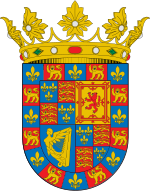
Duke of Berwick
Dukedom of Spain / From Wikipedia, the free encyclopedia
Dear Wikiwand AI, let's keep it short by simply answering these key questions:
Can you list the top facts and stats about Duke of Berwick?
Summarize this article for a 10 year old
Duke of Berwick (/ˈbɛrɪk/) (Spanish: Duque de Berwick) is a title that was created in the Peerage of England on 19 March 1687 for James FitzJames, the illegitimate son of James II and VII, King of England, Scotland, and Ireland and Arabella Churchill. The title's name refers to the town of Berwick-upon-Tweed in England, near the border with Scotland.
| Dukedom of Berwick | |
|---|---|
   Upper: arms of the Dukedom of Berwick in the peerage of England (1687–1695) Lower: arms of the Dukedom of Berwick in the peerage of Spain (1707–present) | |
| Creation date | 1687 (created English title) 1707 (confirmed Spanish title) |
| Created by | James II Philip V |
| Peerage | Peerage of England Peerage of Spain |
| First holder | James FitzJames |
| Present holder | Jacobo Hernando Fitz-James Stuart y Gómez (English title) Carlos Fitz-James Stuart y Martínez de Irujo (Spanish title) |
| Heir apparent | Luis Esteban Fitz-James Stuart y Gómez, 14th Marquess of Valderrábano (English title) Fernando Fitz-James Stuart, 17th Duke of Huéscar (Spanish title) |
| Remainder to | the 1st Duke's heirs male of the body lawfully begotten (English title) the 10th Duke's heirs, both male or female (Spanish title) |
| Subsidiary titles | Peerage of England only:
|
| Seat(s) | Liria Palace |
The titles of Baron Bosworth and Earl of Tinmouth were created at the same time, and they are subsidiary to the English dukedom. As a noted Jacobite, the 1st Duke did not receive a Writ of Summons to take his place in the House of Lords[1] after 1695, and thus the title has long been assumed to be dormant. However, as its creation is not considered part of the illegitimate Jacobite peerage, and no Writ of attainder was issued by Parliament for the Dukedom (although it was for the Duke himself), the title is still considered by some as theoretically extant, albeit dormant, in the Peerage of England and could be petitioned for reinstatement by the legitimate heirs male of the body (as detailed below in the list of Jacobite succession).
Since 13 December 1707, when Philip V, King of Spain confirmed the title in his country, and conferred the dignity of Grandee to the 1st Duke of Berwick, the dukedom is also a title of Spanish nobility. However, unlike the English peerage, the Spanish title follows the rule of absolute primogeniture, which allows a female to succeed if she is the first-born child. Thus following the death of the 10th Duke of Berwick in September 1953, who had only a daughter, the succession has divided into two separate lines.
At this point, the English title was inherited by the nephew of the 10th Duke, Don Fernando Fitz-James Stuart y Saavedra, 19th Duke of Peñaranda (1922–1971), and subsequently Fernando's son Don Jacobo Fitz-James Stuart y Gómez, 20th Duke of Peñaranda (born 1947), who became the 12th Duke of Berwick in 1971. The heir presumptive to the Dukedom is the 12th Duke’s younger brother Don Luis Fitz-James Stuart y Gómez, 14th Marquess of Valderrábano (born 1950). Under the English rule of male primogeniture, since Jacobo and his brother Luis do not have male issue, it is expected that the English peerage title will become extinct, and with it the agnatic House of Stuart.
In contrast, in 1953, the Spanish title was inherited by the 10th Duke’s only daughter, Doña Cayetana Fitz-James Stuart, 18th Duchess of Alba (1926-2014), who was, in her own right, the 11th Duchess of Berwick. When she died in 2014, her son Don Carlos Fitz-James Stuart, 19th Duke of Alba (born 1948) succeeded to the title. The heir apparent to the dukedom is his eldest son Don Fernando Fitz-James Stuart, 17th Duke of Huéscar (born 1990).
Oops something went wrong: